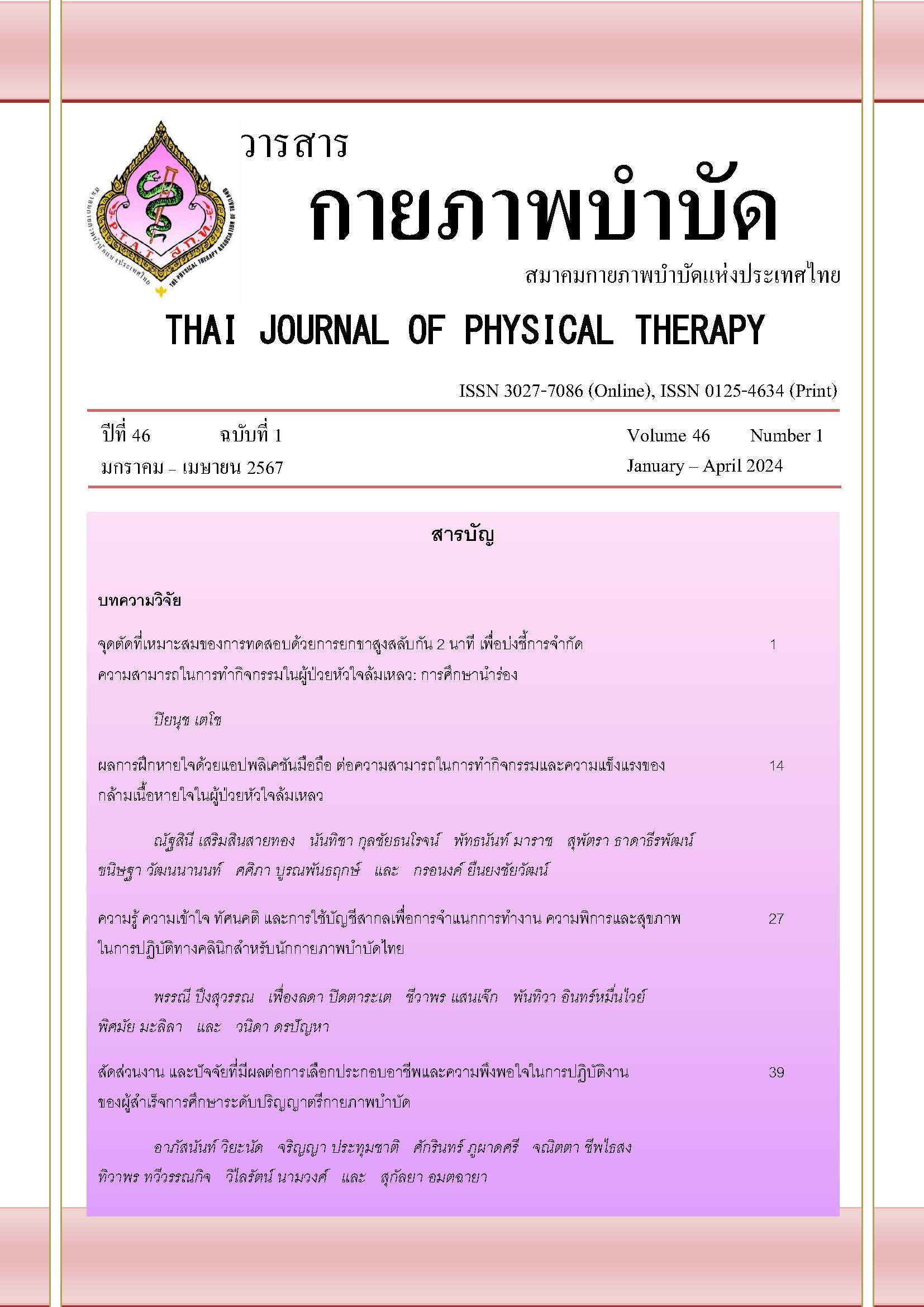ความรู้ ความเข้าใจ ทัศนคติ และการใช้บัญชีสากลเพื่อการจำแนกการทำงาน ความพิการและสุขภาพในการปฏิบัติทางคลินิกสำหรับนักกายภาพบำบัดไทย
Main Article Content
บทคัดย่อ
ที่มาและความสำคัญ: บัญชีสากลเพื่อการจําแนกการทํางาน ความพิการ และสุขภาพ (International Classification of Functioning, Disability and Health) หรือ ICF เป็นกรอบการทำงานเพื่อจัดทำแนวทางที่เป็นมาตรฐานและครอบคลุมในการอธิบายและจัดหมวดหมู่ข้อมูลที่เกี่ยวข้องกับสุขภาพและความพิการ ในประเทศไทย ICF ใช้เป็นคู่มือมาตรฐานในการประเมินและจำแนกประเภทความพิการ อย่างไรก็ตาม ดูเหมือนว่าจะมีช่องว่างในความเข้าใจและการตระหนักเกี่ยวกับ ICF ในกลุ่มนักกายภาพบำบัดประเทศไทย
วัตถุประสงค์: เพื่อสำรวจความรู้ ความเข้าใจ และทัศนคติของการใช้ ICF และ ICF core set ในนักกายภาพบําบัดประเทศไทย
วิธีการวิจัย: นักกายภาพบำบัดในโรงพยาบาลสังกัดกระทรวงสาธารณสุขประเทศไทย จำนวน 346 คน ได้เชิญเข้าร่วมเป็นอาสาสมัคร เพื่อตอบแบบสอบถามความรู้ ความเข้าใจ และทัศนคติในการใช้ ICF ผ่าน Google form แบบสอบถามนี้ได้รับคำแนะนำจากผู้เชี่ยวชาญ 3 ท่าน และให้นักกายภาพบำบัดทดสอบก่อนใช้ อาสาสมัครส่งแบบสอบถามกลับภายใน 2 เดือน วิเคราะห์ข้อมูลโดยใช้สถิติเชิงพรรณนา
ผลการวิจัย: นักกายภาพบำบัดตอบแบบสอบถามทั้งหมด 191 คน (ร้อยละ 55.20) ผู้ตอบแบบสอบถามส่วนมากรู้จัก ICF ร้อยละ 74.35 และมีความรู้ ความเข้าใจ อยู่ในระดับปานกลาง ร้อยละ 52.11 และไม่รู้จัก ICF core set ร้อยละ 71.83 ส่วนการนำ ICF ไปใช้งานทางคลินิกพบว่าส่วนมากนำไปใช้ร้อยละ 52.82 และมีผู้ที่ไม่เคยฝึกอบรมหรือเรียนรู้เกี่ยวกับ ICF มาก่อนพบร้อยละ 57.59 ผู้ตอบแบบสอบถามส่วนมากร้อยละ 47.89 มีมุมมองที่ดีต่อการใช้ ICF แต่มีอุปสรรคเกี่ยวกับความรู้และความเข้าใจในการใช้
สรุปผล: การศึกษาครั้งนี้อาจกล่าวได้ว่า การศึกษาและการฝึกอบรม ICF มีความจำเป็นเพื่อเพิ่มความสามารถของนักกายภาพบำบัดในการใช้ ICF อย่างมีประสิทธิภาพ และเป็นเนื้อหาในหลักสูตรของสถาบันผลิตนักกายภาพบำบัด
Article Details

อนุญาตภายใต้เงื่อนไข Creative Commons Attribution-NonCommercial-NoDerivatives 4.0 International License.
เอกสารอ้างอิง
World Health Organization Geneva. Classification of Work, Disability and Health: ICF. Translated by Department of Medicine, Ministry of Public Health, 2004, 1-45. (in Thai)
Nualnetr N. Clinical thinking and decision-making processes for physiotherapy. [Document for teaching physical therapy, Khon Kaen University] 2020. (in Thai)
Physiopedia. 2002. International Classification of Functioning, Disability and Health (ICF). [Online]. Available from: https://www.physiopedia.com/International _Classification_of_Functioning, Disability_and_Health_(ICF) [April 06, 2022].
Pernambuco AP, Lana RC, Polese JC. Knowledge and use of the ICF in clinical practice by physiotherapist and occupational therapist of Minas Gerais. Fisioter Pesqui. 2018; 25(2):134-42.
Farrell J, Anderson S, Hewitt K, Livingston MH, Stewart D. A survey of occupational therapists in Canada about their knowledge and use of the ICF. Can J Occup Ther. 2007;74(1):221-32.
Maini M, Nocentini U, Prevedini A, Giardini A, Muscolo E. An Italian experience in the ICF implementation in rehabilitation: Preliminary theoretical and practical considerations, Disabil Rehabil. 2008;30(15):1146-52.
Schiariti V, Longo E, Shoshmin A, Kozhushko L, Besstrashnova Y, Król M et al. Implementation of the International Classification of Functioning, Disability, and Health (ICF) Core Sets for Children and Youth with Cerebral Palsy: Global Initiatives Promoting Optimal Functioning. Int J Environ Res Public Health. 2018;15(9):1899.
Pimdee A, Nualnetr N. Applying the International Classification of Functioning, Disability and Health to guide home health care services planning and delivery in Thailand, Home Health Care Serv Q. 2017;36(2):81-95.
Tongsiri S. Functioning data based on the International Classification of Functioning, Disability and Health (ICF) classification system: implications for multidisciplinary rehabilitation plans for persons with disabilities. J Health Syst Res. 2013; 07(1):99-113.
Satangmongkol K. 2019. Review of sample size formula for Taro Yamane. [Online]. Available from: https://datarockie.com/blog/yamane-sample-size-calculation/ [April 15, 2022]. (in Thai)
Potisarn P. Likert Scale. In: Pirat B, editor. Encyclopedia of Education. P.S Pattana Publishing; 2003. Vol. 31; p. 17-20 (in Thai)
Rattanamanee N, Phasunon P. Response rate in quantitative research. JHS.TRU. 2019;13(3): 181-88. (in Thai)
Sombutteera K, Thavornpitak Y. Response rate and factors associating mailed questionnaire response rate in nursing sciences and public health research. KKU Res J (GS). 2015;15(1): 105-13. (in Thai)
Mantruad R, Puntumetakul R, Peungsuwan P. Content validity and reliability of the modified international classification of functioning, disability and health (ICF) core set for osteoarthritis (Thai version) in patients with knee osteoarthritis. J Med Tech Phy Ther. 2018;30(2): 205-15. (in Thai)
Junsorn J, Chatchawan U, Peungsuwan P. Content validity and reliability of the international classification of functioning, disability and health for falls (Thai version) in stroke patients. J Med Tech Phy Ther. 2018; 30(3):311-22. (in Thai)
Somkaew W. The use of the Functional-based data in empowerment plan of persons with disabilities in Rattanaburi district, Surin province. Med J Srisaket Surin Buriram Hosp 2020; 35(2):257-68. (in Thai)
Tongsiri S. Use of the International Classification of Functioning, Disability and Health (ICF) to develop database of persons with disabilities (PWDs). Srinagarind Med J. 2013;28(1):131-42. (in Thai)
Steiner WA, Ryser L, Huber E, Uebelhart D, Aeschlimann A, Stucki G. Use of the ICF model as a clinical problem-solving tool in physical therapy and rehabilitation medicine. Phys Ther. 2002;82(11):1098-107.


